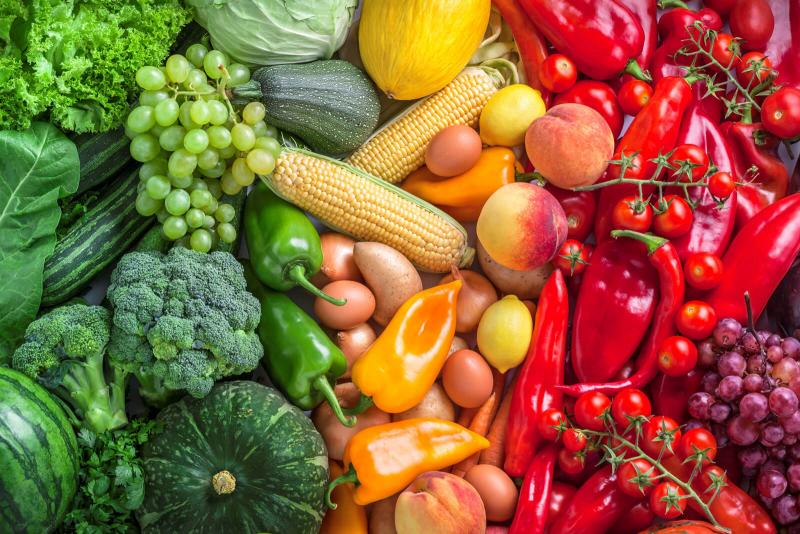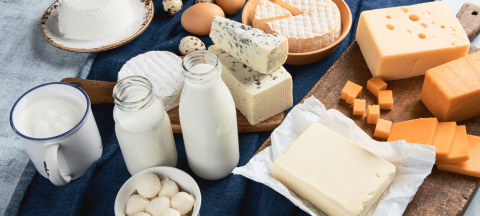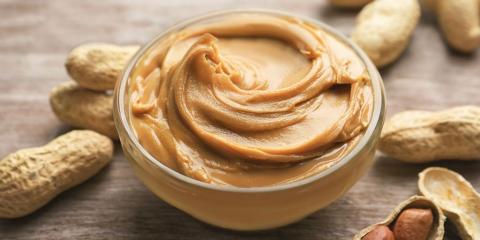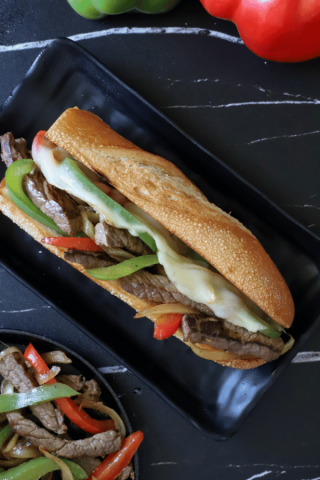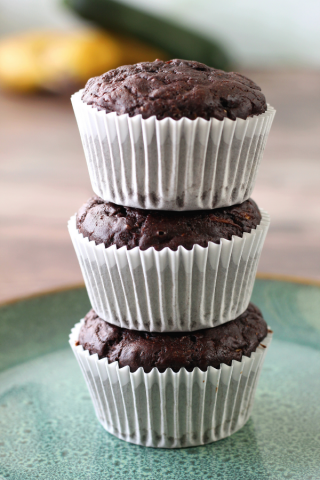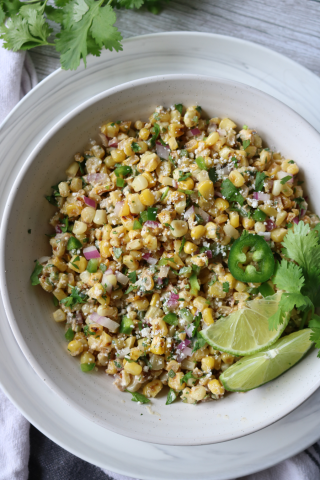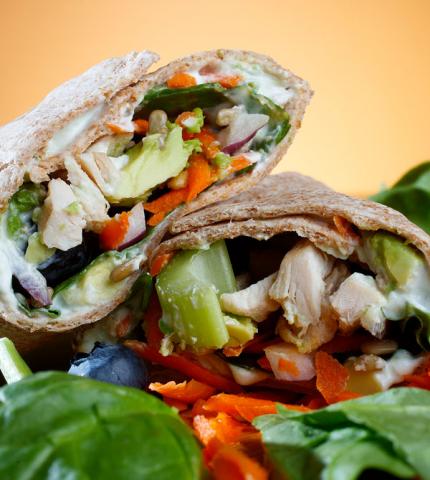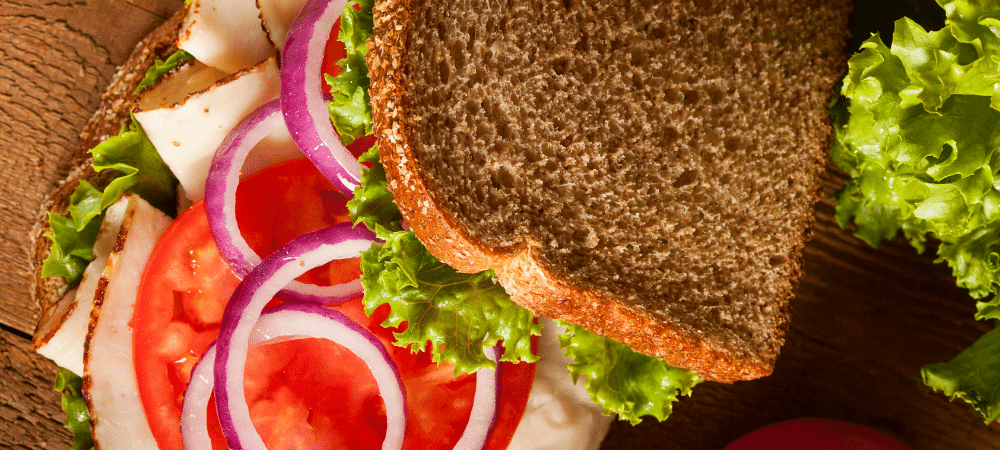
Sandwiches make quick, easy, and nutritious meals. Check out the following tips on how to experiment with different veggies and fruits, lean meats, whole grains, and sandwich spreads.
Tips for Healthier Sandwiches:
- Choose whole grains. Vary the taste and texture of sandwiches with whole grains. Grains provide many nutrients vital for health, such as dietary fiber, B vitamins, and minerals. Try out different ways to hold sandwich fillings with pita pockets, bagels, tortillas, and whole wheat or rye breads.
- Use food labels. The color of a product isn't always a good indicator of whether it's a whole grain. Bread can be brown due to molasses or other added ingredients. Choose foods with these ingredients that are listed first on the ingredient list: brown rice, oatmeal, wild rice, whole-grain corn, whole oats, whole rye or whole wheat. Also, check the Nutrition Facts Label and choose products with higher fiber content.
- Try different fillings. Instead of mixing shredded tuna, turkey, or chicken with mayonnaise, use lowfat plain yogurt. For added flavor and crunch, add chopped onion, celery, and cucumber or pickle. And, to really kick up the flavor, add in herbs or spices such as dill or cumin. Instead of the traditional peanut butter and jelly sandwich, try peanut butter and sliced banana.
- Sandwich spreads. Use different sandwich spreads to kick up the flavor and nutrition. Go easy on spreads such as mayonnaise, margarine, butter, and cream cheese because they add fat and calories and little nutritional value. Instead, try low-fat plain yogurt, different flavors of hummus, mustard or honey mustard, or light dressing.
- Boost nutrition with tasty toppings. Give your sandwich a nutritious boost by adding vegetables or fruit. Different veggies include spinach, arugula, sliced zucchini, cucumber, green or red peppers, red onion, and grated carrots. Fruits to try on sandwiches include sliced apples, pineapple, and banana.
- Go lean with protein. Choose lean turkey, roast beef, ham, or low-fat luncheon meats for sandwiches instead of luncheon/deli meats with more fat, such as regular bologna or salami. Processed meats such as hams and luncheon or deli meats have added sodium. Check the ingredient and Nutrition Facts Label to help limit sodium intake.
- Food safety for the sandwiches on the go. Pack and store sandwiches in an insulated tote. Use an ice pack, gel pack, or freeze a juice box, bottled water or the sandwich itself. For best quality, don't freeze sandwiches with mayonnaise, lettuce, or tomatoes; add them right before eating. Use coarse-textured breads that don't get soggy as the sandwich thaws. Frozen juice boxes, water, and sandwiches will thaw by lunch.
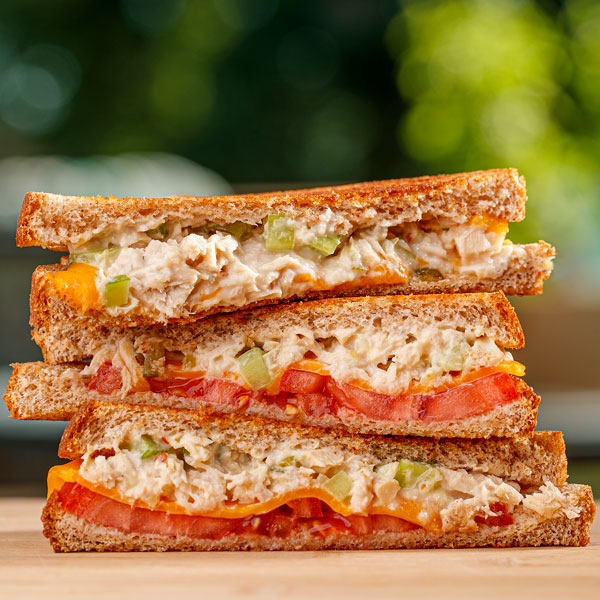
Tuna Melt
Yield: 4 servings
Ingredients:
- 2 (5 ounce) cans tuna in water, drained
- ¼ cup light mayonnaise
- 1 stalk celery, scrub with clean vegetable brush under running water, thinly sliced
- 2 Tablespoons onion, scrub with clean vegetable brush under running water, chopped
- 2 Tablespoons dill pickle relish
- 1 Tablespoon fresh parsley, gently rub under cold running water or 1 teaspoon dried parsley (optional)
- ½ teaspoon red pepper flakes (optional)
- Black pepper, to taste
- Salt, to taste
- 2 Tablespoons margarine
- 8 slices whole wheat bread
- 4 slices tomato (optional)
- 4 slices low-fat Cheddar cheese
Directions:
- Wash hands with soap and water.
- In a medium bowl, combine drained tuna, mayonnaise, celery, onion and relish. Add parsley, red pepper flakes, if desired, black pepper and salt. Mix with a fork.
- Spread margarine on one side of each bread slice.
- Place margarine side of bread on the skillet.
- Top plain side of bread with ½ cup of tuna salad. Top tuna salad with one slice of tomato, if desired and one slice of cheese. Top with a second slice of bread, margarine side facing up. Repeat with remaining sandwiches.
- Heat skillet over medium heat*. Cook sandwiches until brown. Flip and repeat on the other side.
- Store leftovers in a sealed container in the refrigerator for up to four days.
Notes:
*If your skillet is too hot, the bread will burn before the sandwich is heated through and the cheese is melted. Lower the temperature, if needed.
Nutrition Information:
- Serving Size (¼ of recipe):
- Calories 330
- Total Fat 14g
- Saturated Fat 3g
- Cholesterol 25mg
- Sodium 900mg
- Total Carbohydrates 28g
- Fiber 5g
- Total Sugars 4g, includes 2g Added Sugars
- Protein 20g
- Vitamin D 6%
- Calcium 15%
- Iron 15%
- Potassium 6%
Nutrition Software Used:
ESHA Food Processor
Source:
- Hillan, J., Minton, E., and Bobroff, L. (2015). Healthy Eating: Super Sandwiches. Publication #FCS8699. University of Florida, Cooperative Extension Service. Accessed at: https://aging.nm.gov/uploads/files/26%20-Healthy%20Eating%20Super%20Sandwiches.pdf
- Packed Lunch Safety, Nebraska Extension
- MyPlate, United States Department of Agriculture
Feedback Form
Feedback Form
If you do not see the article, please scroll up the page.
